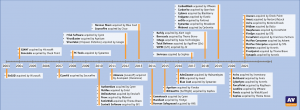AV-Comparatives Explains the Implications of Takeovers in the IT-Security Industry

Logo AV-Comparatives
Test results can illustrate how purchased products have been developed
— Andreas Clementi, founder and CEO, AV-Comparatives
INNSBRUCK, TYROL, AUSTRIA, November 29, 2021 /EINPresswire.com/ — In recent years, there have been many acquisitions of security software manufacturers. This article considers the implications of such takeovers, with regard to cybersecurity, consumer choice and other factors. AV-Comparatives notes that their test results can help uncover any technical changes resulting from AV-vendor acquisitions.
McAfee’s consumer division has just been purchased by investors. NortonLifeLock, which produces the Norton Security consumer AV product, is taking over Avast. This means that the Norton, BullGuard, Avast, AVG, and Avira security products will be under the same ownership.
Are takeovers of antivirus vendors a good or a bad thing?
When one antivirus vendor buys another, it is arguable that combining the best protection technologies of the two products can bring about an improvement in security. Balanced against this is the fact that the market will take a step in the direction of a monopoly when a competing vendor disappears. As a general rule, monopolies are a bad thing and competition is a good thing. Where a monopoly exists, there is no consumer choice, and the vendor has no incentive to improve its product or service, or to lower its prices. In the specific case of antivirus programs, a monopoly would be especially bad, because malware authors would only have one type of defence to bypass in order to infect computers. However, it’s also true that investment in an antivirus vendor will allow that company to improve its research and development facilities, thus improving its product’s protection against malware.
So, the answer to the question above is that it depends very…




